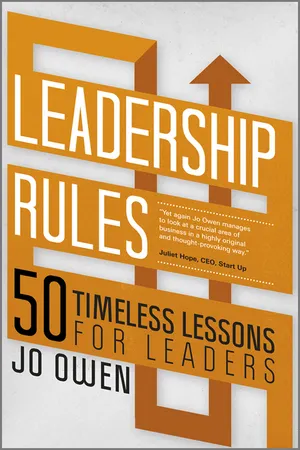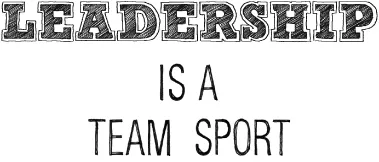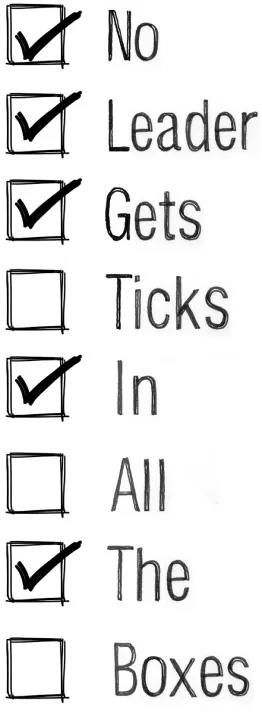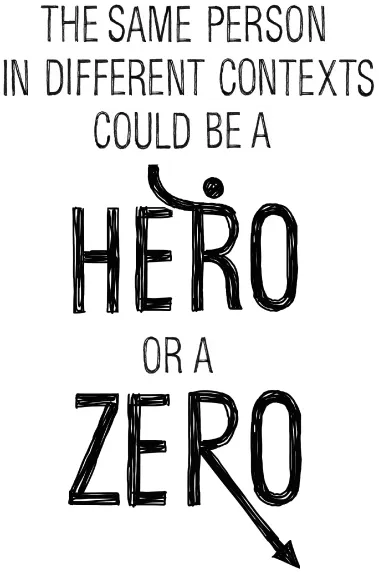![]()
THE QUALITIES OF A LEADER
INTRODUCTION
For thousands of years, leaders have got by without having an MBA. If kings and queens needed smart people, they could find plenty of churchmen to provide the brains. And even today, if you look at the planet’s top billionaires, they are largely an MBA-free zone. None of the tribal leaders who feature in this book have MBAs, and many of them cannot read.
So there is something more to leadership than having all the skills that a business school can give you. Those skills are important, but they are not enough.
When looking for a leader, tribes do not look at formal qualifications. They look at the person. They do not look at the person’s DNA: they are not looking for some innate quality such as charisma and inspiration. They are looking for a simpler set of personal qualities which any of us can acquire with enough effort and determination.
By looking at what makes good tribal leaders and historical leaders, we can find the essence of what makes a good leader today. Leadership in the tribal world is leadership stripped bare: it is the leadership without the corporate life support systems that enable us and imprison us at the same time.
As you take this journey in search of leadership you will make three pleasant discoveries:
- You do not have to be perfect to be a leader, because no leader is ever perfect.
- Anyone can learn to lead. There is no mysterious ingredient which you either have or do not have.
- You do not have to wait until you are CEO before leading: you can show you are a leader at any level of your tribe.
Enjoy your journey in search of the essence of leadership.
![]()
CHAPTER 1
THE LEADERSHIP RIDDLE
If you read enough leadership books you will realise that to succeed you need to become an improbable mix of Nelson Mandela, Lord Nelson, Machiavelli, Churchill, Genghis Khan and Mother Teresa all put together. Some bosses think they are already that good: they are normally bosses who are well worth avoiding.
As an experiment, see what happens when you swap Genghis Khan for Mother Teresa. So let Genghis Khan sort out the slums of Calcutta in his own unique way. He would succeed: there would be no slums left. Now imagine Mother Teresa on horseback leading the Mongols on their rampage across Asia. For most people, this does not work.
So it is clear, we cannot succeed by being someone else. We are who we are, and we are not suddenly going to become Churchill or Mandela.
But equally, we cannot succeed by just being ourselves. If we hang around like a teenager in full hormonal angst waiting for the world to recognise our innate genius, humanity and natural leadership talent, we will wait for a very long time.
So we cannot succeed by being someone else and we cannot succeed by just being ourselves. We are doomed.
Or perhaps not. There is one way out of the riddle: be the best of who you are.
“Be the best of who you are” sounds trite, but is not. First, it means focusing on your own unique strengths. Think of various bosses you have had. You may wonder how some of them ever became a boss with their glaring weaknesses. But even my worst bosses had one or two signature strengths which propelled them to the top. Successful leaders are like any successful performer: they build on strength, not on weakness.
Bizarrely, most evaluation and development systems focus on weaknesses or “development opportunities” in the jargon. Olympic athletes do not succeed by focusing on weakness: making weightlifters focus on their synchronised swimming skills would be entertaining, but not effective.
If you want to succeed, work out what you are really good at. Then make sure you find roles where you can play to your strengths. Avoid assignments that focus on your “development opportunities” unless you want to set your career back by years. The way to deal with weaknesses is not to focus on them, but to work around them. Leadership is a team sport, so make sure you have a team that complements your talents: if you are not great at book keeping, or strategy, or customer service, or financial analysis, you can find plenty of people who are.
![]()
CHAPTER 2
ARE YOU LEADING?
Try the following exercise.
Name as many Prime Ministers as you can (or Presidents of your country) since 1945. And name one thing you remember most about them. Here is what I am told by groups when they try this exercise:
Attlee: welfare state
Churchill in peacetime: er … not much
Eden: Suez crisis
Macmillan: “You’ve never had it so good”
Home: Who’s he?
Wilson: “White heat of the technology revolution” (er … which technology was that?)
Heath: Sailing and going into Europe
Wilson again: Pipes, raincoats and the lavender list
Callaghan: Strikes and the three day week
Thatcher: Thatcherism (for better or worse)
Major: er … not much
Blair: Iraq
Brown: Financial crisis
Cameron: too early to tell
Few leaders through history get remembered for very much at all. And most of them are not remembered how they would like to be remembered, which is why they are so keen to write their autobiographies. Only Attlee and Thatcher are remotely close to being remembered in a way that they would hope to be remembered. Most Prime Ministers have followed the course of history rather than changing the course of history.
If it is hard for Prime Ministers to be remembered clearly and positively, it is even harder for business leaders to be well remembered. Try naming the leaders of your business for the last 50 years and see how far you get.
So how will you be remembered?
In truth, none of us are likely to be remembered for our great exploits in mastering PowerPoint or closing the month end accounts on time. But we still need to make our mark. If we want to progress on the leadership ladder, we need to stand out from our colleagues. It is not enough to have done well, because everyone else will have done well. You need a distinctive claim to fame. A good claim to fame is where you go above and beyond your normal remit: you take on a challenging project; you lead an initiative which cuts across the organisation; you develop a new idea or a new way of working.
But, as the Prime Minister test shows, it is all too easy to be remembered for the wrong thing. Just like Prime Ministers, we are likely to be remembered for how we are as much as for what we do. So appearances and behaviour count, especially when in view of senior management. You can make your mark by being consistently positive, reliable and action focused. These are low hurdles over which most of your colleagues will fall. If you have a presentation to make at a conference, or a proposal to submit, over-invest time in making it superb. Be remembered the right way.
![]()
CHAPTER 3
ARE YOU GOOD ENOUGH TO LEAD?
I was walking through the bush when a randy ostrich decided to attack: we were crossing his territory. There are many distinguished ways of dying in the bush. Being eaten by crocodiles or lions at least gives your family a good story to remember you by. But being disembowelled by a randy ostrich means you are as likely to die of shame as you are from the disembowelment.
Unfortunately, ostriches are one of the fastest animals on land. They can reach 70 kilometres an hour, which would get them a speeding ticket in London. Fortunately, I was faster than my guides. You do not need to outrun an ostrich, you need to outrun your peers.
The same is true of the leadership race. You do not need to be the best leader on the planet. No leader gets ticks in all the boxes: even the best leaders have their faults. And this does not matter. You simply need to be better than your colleagues in a relevant way. The trick is to know what the “relevant way” is for your desired role. This is where things become tricky: the rules of survival and success change at each level of the firm:
- When you start out on the leadership race, the expectations at least are clear. New and aspiring leaders may not have much power or control, but at least they have clarity about what they must do. To succeed, you have to show that you have mastered your trade, be it trading, teaching or technology.
- In the next stage of the leadership race, you find all the rules change. It is no longer about being the best technician. Leadership is about getting things done through other people: managing people becomes essential. Many aspiring leaders do not realise that the rules of the game have changed and their career is effectively disembowelled. They go nowhere very fast.
- As you rise to more senior positions, the rules of survival and success change again. Managing people well is not enough. You have to manage the organisation and its politics: making alliances, doing deals, building trust, aligning agendas.
- Once you finally achieve top leadership, things become easier: your authority and responsibility is more in balance and any ambiguity is entirely of your own making. Whisper it quietly, but leading from the top is easier than leading from the middle. Top leaders often fail because they do not know how to handle their new-found freedom: they are either too timid or too bold.
At evaluation time, ignore the formal evaluation systems, which are little more than school reports for grown ups. Ask yourself what you need to be doing to perform better than your peers in a way that is relevant to bosses at the top of the organisation.
![]()
CHAPTER 4
THE PERFECT LEADER
No leader in history has been perfect. You do not need to be perfect either, because perfection does not exist in leadersh...




